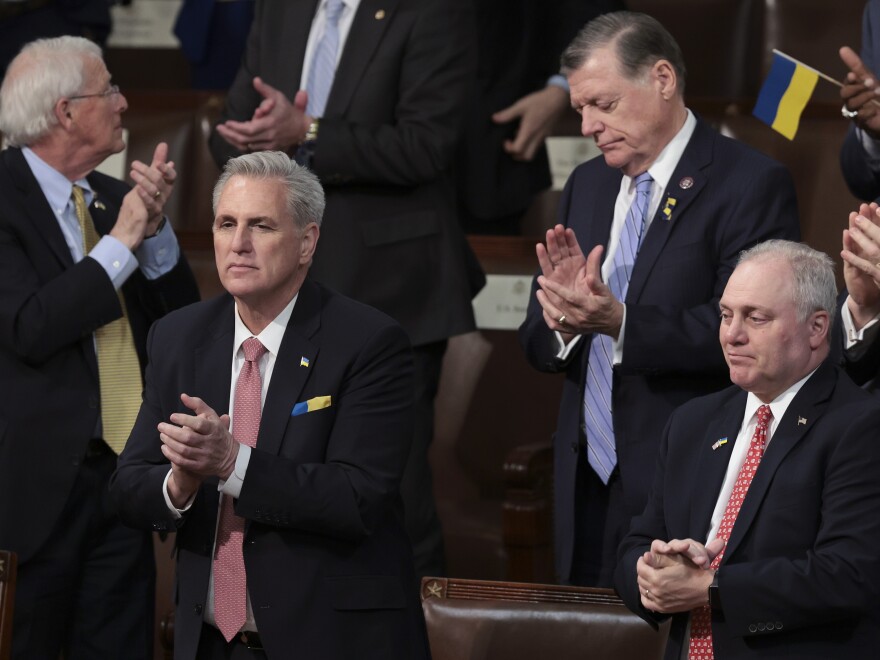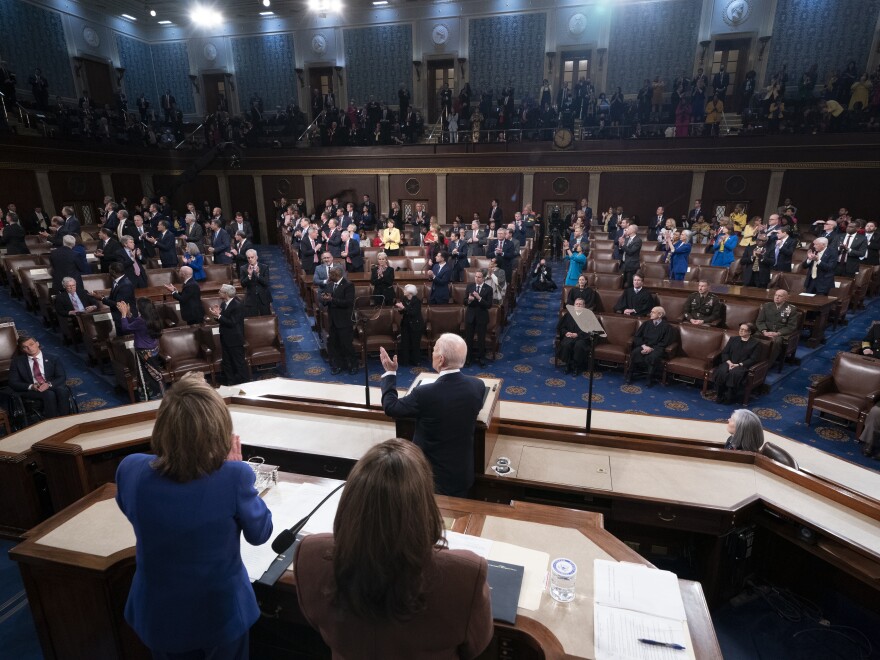In his State of the Union speech a year ago, President Biden launched almost immediately into a scathing critique of Russian President Vladimir Putin's "menacing ways" for invading Ukraine.
But this year, it took more than an hour before Biden talked about the war, calling the Russian invasion "a test for America."
A year into the conflict in Ukraine, both Biden's message and the reception it gets in Congress has changed, reflecting domestic politics and the drawn-out nature of the conflict itself.
Biden's speech was far more about his priorities at home in what many believe was a speech laying the ground for a second run for the White House.
Last year, Ukraine support was on full display
A few members of Congress wore blue and yellow ribbons on their lapels this year. But a year ago, the House chamber was awash in the colors of Ukraine's flag as lawmakers gave multiple vigorous and bipartisan standing ovations for Biden's message on the war.
It had been only six days since Russia invaded Ukraine when Biden made his way to Capitol Hill for the speech, castigating Putin at length. "He badly miscalculated," Biden said. "He thought he could roll into Ukraine and the world would roll over. Instead, he met a wall of strength he never imagined."
This year, Biden spent less than two minutes discussing the war. He received bipartisan applause when he asked whether Americans would "stand for the defense of democracy" — but not all members stood.
Biden's message on Ukraine has also changed from a year ago
Last year, Biden mainly spoke about how the United States would cut Russia off from the international financial system with crippling sanctions.
"Tonight, I say to the Russian oligarchs and the corrupt leaders who've bilked billions of dollars off this violent regime: no more," Biden said a year ago.
This year he didn't talk about sanctions — measures that have crimped the Russian economy but failed to stop the war.
The U.S. emphasis has turned to supplying Ukraine with military and economic aid, support that has so far topped $110 billion. Biden did not specifically talk about the aid — other than one brief allusion
"Ambassador, America is united in our support for your country," Biden said, when recognizing Ukraine's ambassador Oksana Markarova — who was a special guest for both speeches.
"We will stand with you as long as it takes."

Americans still support Ukraine, but some aren't happy about how much aid is going there
While Americans were very united about giving aid to Ukraine a year ago, that support has declined.
A Pew Research Center survey conducted last month showed that about a quarter of Americans say the United States is giving too much aid to Ukraine, up significantly from a year ago. The shift has occurred mostly among Republicans.
In December, a poll from the Chicago Council on Global Affairs found 40% of respondents said the United States should "maintain its current level of support for Ukraine indefinitely." But Americans are divided on whether the United States should support Ukraine for "as long as it takes," with support dropping 10 percentage points since the summer.
Republican strategist Ryan Williams said this sentiment has given pause to some Republicans from conservative districts who had supported the war, but are now worried about wider public support among their constituencies.
"It is having an impact with the base. And if that continues to grow, that's going to potentially be a primary issue for Republicans," Williams said. "The key is to make sure that that it doesn't become a big issue with Republicans, a litmus test issue, if you will, that could endanger incumbents who could face conservative primary challengers that may have a difference of opinion."
Copyright 2023 NPR. To see more, visit https://www.npr.org.





